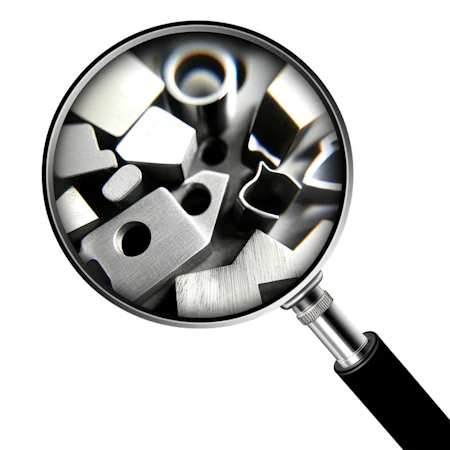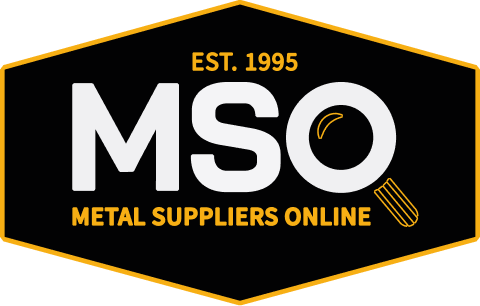Back To Browse
Titanium
Titanium 6-2-4-6
Aging Procedure
Hold at 579-607 C(1075-1125 F) for 8 hours and air cool.
Annealing Procedure
Triplex-Beta minus 14 C(25 F), 1-2 hours, air cool, plus 801-857 C(1490-1595 F), 1-4 hours, air cool plus 593 C(1100 F) 4-8 hours, air cool. For stress relief, heat to 482-649 C(900-1200 F), hold for 1-4 hours and air cool.
Applications
Generally selected over 6-2-4-2 for applications requiring strength at temperatures up to 454 C(850 F). Found in gas turbine discs and impellers and has been evaluated for use in deep sour well applications.
Cold Workability
The cold working characteristics of this alloy are similar to those found in austenitic stainless steels. In multiple forming operations, intermediate stress relieving is recommended to offset the alloy's tendency to work harden. Post-work annealing is recommended to reattain maximum performance characteristics.
Forgeability
Work at 843-927 C(1565-1725 F) from bar and billet.
Formability
This alloy can be hot or cold formed and will exhibit characteristics equivalent to those found in a 1/8 to 1/4 hard austenitic stainless steel.
Heat Treatability
Solution treat at 843-913 C(1550-1675 F), air, oil or water quench.
Hot Workability
Hot forming will reduce both the springback and required forming forces, and will increase the overall ductility of the material.
Machinability
As a family, titanium and its alloys have developed a mystique as a nightmare to machine. This is simply not the case. Experienced operators have compared its characteristics to those found in 316 stainless steel. Recommended practice includes high coolant flow(to offset the material's low thermal conductivity), slow speeds and relatively high feed rates. Tooling should be tungsten carbide designations C1-C4 or cobalt type high speed tools.
Other Physical Properties
Beta Transus (F+/- 25) 1710
Principle Design Features
This is a heat treatable, alpha-beta alloy which was designed primarily for high temperature applications requiring higher strength than alloy 6-2-4-2 at similar temperatures. It combines good corrosion resistance and strength with weldability and fabricability. The alloy is generally available at the mill level in bar and billet form.
Weldability
Rated as" limited" in terms of weldability.
Known Forms
Closed Die Forgings
Flanges
Flat Bar
Forgings-Discs
Hexagon Bar
Open Die Forgings
Pipe-Seamless
Pipe-Welded
Plate
Round Bar
Seamless Rolled Rings
Sheet
Square Bar
Strip
Tube-Round (Seamless)
Tube-Round (Welded)
Wire-Round
Wire-Welding
Billet
Coil
Contour Rings
Fasteners
Fittings
Forgings-Upset
Mandrel Rings
Shafts
Shapes-Extruded
Welded Rings
Additional Data
Specifications
4981,3.7164,T-9046,1222,1223,1224,1225,R56260Dismiss
Chemical Elements
| Aluminum | 5.5 - 6.5 |
| Carbon | 0.04 max |
| Hydrogen | 0.0125 max |
| Iron | 0.15 max |
| Molybdenum | 5.5 - 6.5 |
| Nitrogen | 0.04 max |
| Oxygen | 0.15 max |
| Tin | 1.75 - 2.25 |
| Titanium | Balance |
| Zirconium | 3.5 - 4.5 |
Physical Properties
Density: 0.169lb/in³
Melting Point: 1635°F
Specific Gravity: 4.65
Thermal Conductivity: 0.3417BTU/hr·ft·°F
Mechanical Properties
Modulus of Elasticity – Tension: 16MSI
Thermal Expansion
| Condition | Min | Max | Expansion Coefficient |
|---|---|---|---|
| Annealed | 32 °F | 212 °F | 4.8 µin/in/°F |
| Annealed | 32 °F | 600 °F | 5.7 µin/in/°F |
| Annealed | 32 °F | 1000 °F | 5.8 µin/in/°F |
Rupture Test Data
| Condition | Form | Temperature | Time | Rupture Strength |
|---|---|---|---|---|
| Test Specimen Annealed | Sheet | 900 °F | 100 Hours | 109 KSI |
Creep Test Data
| Condition | Form | Temperature | Time | Applied Stress | Creep Strain |
|---|---|---|---|---|---|
| Test Specimen Annealed | Sheet | 800 °F | 100 Hours | 0.2 % | 70 mil/in |
Mechanical Test Data
| Form | Sheet |
| Condition | Solution Annealed & Aged |
| Measurement Temperature | 70°F |
| Elongation | 10% |
| Reduction of Area | 20% |
| Tensile Strength | 170KSI |
| Yield Strength | 160KSI |
| Form | Sheet |
| Condition | Test Specimen Annealed |
| Measurement Temperature | 600°F |
| Elongation | 10% |
| Reduction of Area | 30% |
| Tensile Strength | 150KSI |
| Yield Strength | 125KSI |
| Form | Sheet |
| Condition | Test Specimen Annealed |
| Measurement Temperature | 800°F |
| Elongation | 10% |
| Reduction of Area | 30% |
| Tensile Strength | 140KSI |
| Yield Strength | 110KSI |
| Form | Sheet |
| Condition | Test Specimen Annealed |
| Measurement Temperature | 900°F |
| Form | Sheet |
| Condition | Test Specimen Annealed |
| Measurement Temperature | 1000°F |
| Elongation | 15% |
| Reduction of Area | 50% |
| Tensile Strength | 125KSI |
| Yield Strength | 95KSI |
Find the metal you're looking for today.

